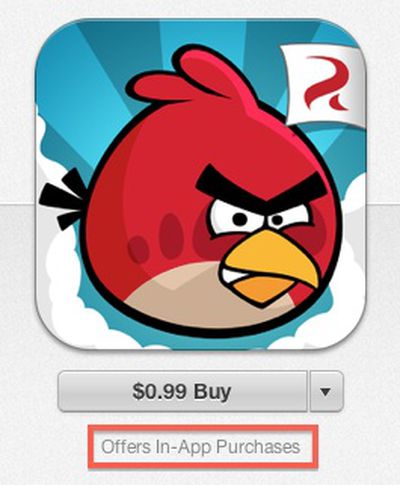Apple Adds 'Offers In-App Purchases' Disclosure for App Store Apps [Update: Now on iOS Stores]
 As noted by The Guardian, Apple today rolled out a new "Offers In-App Purchases" disclosure directly underneath the Buy/Free button for App Store apps supporting the feature. The addition helps make clear to potential purchasers that free or even paid apps may require additional purchases in order to unlock the apps' full functionality or for other benefits such as acquiring in-game currency.
As noted by The Guardian, Apple today rolled out a new "Offers In-App Purchases" disclosure directly underneath the Buy/Free button for App Store apps supporting the feature. The addition helps make clear to potential purchasers that free or even paid apps may require additional purchases in order to unlock the apps' full functionality or for other benefits such as acquiring in-game currency.
The new tagline is currently only appearing in the desktop version of the App Store that sits within iTunes. For now, it's not shown in the iOS App Store app, nor does it appear on webpages for iOS apps.
Apple confirmed to The Guardian that the message is a new addition to the App Store. Its location – directly below the icon and "Free" button on each app's page – makes it even easier for people to identify that an app uses in-app purchases (IAP) before downloading it.
Apple just recently settled a lawsuit over the issue of children being able to make unauthorized in-app purchases sometimes totaling as much as thousands of dollars. With today's move, Apple is clearly attempting to make it even more clear to users before they download or purchase an app whether it includes In-App Purchase content.
The report notes that Apple could easily use the new disclosure to deploy a filter that would allow parents to restrict their children's downloads to only free apps with no In-App Purchase content, but the company has not yet taken that step.
Update: The notifications are now on the iOS App Store as well.
Popular Stories
Apple is preparing a "bold" new iPhone Pro model for the iPhone's 20th anniversary in 2027, according to Bloomberg's Mark Gurman. As part of what's being described as a "major shake-up," Apple is said to be developing a design that makes more extensive use of glass – and this could point directly to the display itself.
Here's the case for Apple releasing a truly all-screen iPhone with no...
While the iPhone 17 Pro and iPhone 17 Pro Max are not expected to launch until September, there are already plenty of rumors about the devices.
Below, we recap key changes rumored for the iPhone 17 Pro models as of April 2025:
Aluminum frame: iPhone 17 Pro models are rumored to have an aluminum frame, whereas the iPhone 15 Pro and iPhone 16 Pro models have a titanium frame, and the iPhone ...
The first iOS 19 beta is less than two months away, and there are already a handful of new features that are expected with the update.
Apple should release the first iOS 19 beta to developers immediately following the WWDC 2025 keynote, which is scheduled for Monday, June 9. Following beta testing, the update should be released to the general public in September.
Below, we recap the key...
If you have been experiencing issues with wireless CarPlay in your vehicle lately, it was likely due to a software bug that has now been fixed.
Apple released iOS 18.4.1 today, and the update's release notes say it "addresses a rare issue that prevents wireless CarPlay connection in certain vehicles."
If wireless CarPlay was acting up for you, updating your iPhone to iOS 18.4.1 should...
Apple's iPhone development roadmap runs several years into the future and the company is continually working with suppliers on several successive iPhone models simultaneously, which is why we often get rumored features months ahead of launch. The iPhone 17 series is no different, and we already have a good idea of what to expect from Apple's 2025 smartphone lineup.
If you skipped the iPhone...
Apple may have updated several iPads and Macs late last year and early this year, but there are still multiple new devices that we're looking forward to seeing in 2025. Most will come in September or October, but there could be a few surprises before then.
We've rounded up a list of everything that we're still waiting to see from Apple in 2025.
iPhone 17, 17 Air, and 17 Pro - We get...
Apple today released iOS 18.4.1 and iPadOS 18.4.1, minor updates to the iOS 18 and iPadOS 18 operating systems that came out last September. iOS 18.4.1 and iPadOS 18.4.1 come two weeks after the launch of iOS 18.4 and iPadOS 18.4.
The new software can be downloaded on eligible iPhones and iPads over-the-air by going to Settings > General > Software Update.
There have been complaints about ...
Apple today updated its vintage products list to add the 2018 Mac mini and the iPhone 6s, devices that will get more limited service and repairs now that they are considered vintage.
The iPhone 6s initially launched in 2015, but Apple kept it around as a low-cost device until 2018, which is why it is only now being added to the vintage list. The iPhone 6s had Apple's A9 chip, and it was...
Apple today released tvOS 18.4.1, a minor update to the tvOS 18 operating system that came out last September. tvOS 18.4.1 comes two weeks after Apple released tvOS 18.4, and it is available for the Apple TV 4K and Apple TV HD models.
tvOS 18.4.1 can be downloaded using the Settings app on the Apple TV. Open up Settings and go to System > Software Update to get the new software....
 As noted by The Guardian, Apple today rolled out a new "Offers In-App Purchases" disclosure directly underneath the Buy/Free button for App Store apps supporting the feature. The addition helps make clear to potential purchasers that free or even paid apps may require additional purchases in order to unlock the apps' full functionality or for other benefits such as acquiring in-game currency.
As noted by The Guardian, Apple today rolled out a new "Offers In-App Purchases" disclosure directly underneath the Buy/Free button for App Store apps supporting the feature. The addition helps make clear to potential purchasers that free or even paid apps may require additional purchases in order to unlock the apps' full functionality or for other benefits such as acquiring in-game currency.






















